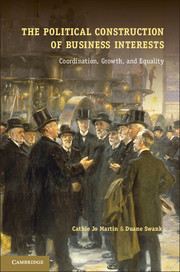Crossref Citations
This Book has been
cited by the following publications. This list is generated based on data provided by Crossref.
Jackson, Gregory
and
Sorge, Arndt
2012.
The trajectory of institutional change in Germany, 1979–2009.
Journal of European Public Policy,
Vol. 19,
Issue. 8,
p.
1146.
Thelen, Kathleen
2012.
Varieties of Capitalism: Trajectories of Liberalization and the New Politics of Social Solidarity.
Annual Review of Political Science,
Vol. 15,
Issue. 1,
p.
137.
Schnyder, Gerhard
and
Jackson, Gregory
2013.
Resilient Liberalism in Europe's Political Economy.
p.
313.
Swank, Duane
2013.
Staatstätigkeiten, Parteien und Demokratie.
p.
307.
Ban, Cornel
2013.
From Cocktail to Dependence: Revisiting the Foundations of Dependent Market Economies.
SSRN Electronic Journal,
McTavish, Duncan
2013.
Looking for Consensus?: Civil Society, Social Movements and Crises for Public Management.
Vol. 2,
Issue. ,
p.
3.
Martin, Cathie Jo
2013.
Resilient Liberalism in Europe's Political Economy.
p.
226.
Gabor, Daniela
and
Ban, Cornel
2013.
Fiscal Policy in Financialized Times: Investor Loyalty, Financialization and the Varieties of Capitalism.
SSRN Electronic Journal,
ANSELL, BEN
and
LINDVALL, JOHANNES
2013.
The Political Origins of Primary Education Systems: Ideology, Institutions, and Interdenominational Conflict in an Era of Nation-Building.
American Political Science Review,
Vol. 107,
Issue. 3,
p.
505.
Martin, Cathie Jo
2013.
Twenty-first century breakdown: Negotiating new regulatory regimes in the Nordic lands.
Capital & Class,
Vol. 37,
Issue. 1,
p.
79.
Martin, Cathie Jo
2013.
Party Politics and the Default Move from Coordination to Liberalism.
Business History Review,
Vol. 87,
Issue. 3,
p.
431.
Engelstad, Fredrik
2014.
Political Elites in the Transatlantic Crisis.
p.
138.
Beramendi, Pablo
and
Rueda, David
2014.
Inequality and Institutions: The Case of Economic Coordination.
Annual Review of Political Science,
Vol. 17,
Issue. 1,
p.
251.
Kinderman, Daniel P.
2014.
Challenging Varieties of Capitalism's Account of Business Interests: The New Social Market Initiative and German Employers' Quest for Liberalization, 2000-2014.
SSRN Electronic Journal,
Hertel-Fernandez, Alexander
2014.
Who Passes Business’s “Model Bills”? Policy Capacity and Corporate Influence in U.S. State Politics.
Perspectives on Politics,
Vol. 12,
Issue. 3,
p.
582.
Walker, Edward T.
and
Rea, Christopher M.
2014.
The Political Mobilization of Firms and Industries.
Annual Review of Sociology,
Vol. 40,
Issue. 1,
p.
281.
Hall, Peter A.
Jacoby, Wade
Levy, Jonah
and
Meunier, Sophie
2014.
The Politics of Representation in the Global Age.
p.
1.
Thewissen, Stefan
and
van Vliet, Olaf
2014.
Competing with the Dragon: Employment and Wage Effects of Chinese Trade Competition in 17 Sectors Across 18 OECD Countries.
SSRN Electronic Journal,
Etienne, Julien
and
Schnyder, Gerhard
2014.
Logics of action and models of capitalism: Explaining bottom‐up non‐liberal change.
Swiss Political Science Review,
Vol. 20,
Issue. 3,
p.
365.
Thewissen, Stefan
and
van Vliet, Olaf
2015.
Competing with the Dragon: Employment and Wage Effects of Chinese Trade Competition in 17 Sectors Across 18 OECD Countries.
SSRN Electronic Journal,



